Committee Member Biographies
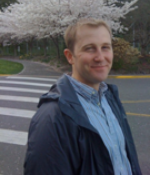 Benjamin Ueland
Benjamin Ueland
Chair
Ben Ueland in an experimental condensed-matter physicist specializing in neutron and x-ray scattering studies of magnetic correlated-electron materials. He earned a Ph.D. in Physics from the Pennsylvania State University in 2007 for his work examining cooperative magnetic-relaxation effects in geometrically-frustrated magnetic oxides using various very-low-temperature thermodynamic measurements. He joined the NIST Center for Neutron Research in 2007 as an NRC Postdoctoral Associate to learn neutron scattering techniques and became a G. T. Seaborg Institute Postdoctoral Associate at Los Alamos National Laboratory in 2010. In 2012, he joined the Correlations & Competition between the Lattice, Electrons, & Magnetism group at Ames Laboratory located at Iowa State University and is currently a staff scientist there. Some of his recent work includes identifying emergent itinerant ferromagnetism in hole-doped BaMn2As2, examining magnetostructural coupling and itinerant magnetic excitations in various 122 pnictide superconductors and related compounds, and characterizing fragile antiferromagnetism in the heavy-fermion YbBiPt.
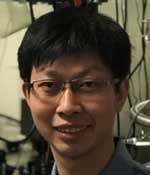
Shaowei Li
Chair-Elect
Shaowei Li is a Heising-Simons Postdoctoral Fellow in the Physics Department, University of California Berkeley. His research focuses on developing a novel imaging technique combining laser and a scanning tunneling microscope (STM) to shatter the diffraction limit and probe the inhomogeneous properties in low dimensional materials. The desire for observing finer details using optical microscopy particularly in bio-science and material-science is pushing technology developments beyond the diffraction limit. The coupling of photon excitation with electron tunneling at the junction of a scanning tunneling microscope combines the femtosecond sensitivity of a laser and the Angstrom resolution of tunneling electrons. The joint fs-A resolution will provide a new window for viewing the unique ultafast dynamics of individual nano-scale objects.
Shaowei received his Ph.D. in physics from UC Irvine in 2017. Prior to that, he received his bachelor's degree in physics from Nankai University in 2010. He spent a year as a postdoctoral fellow at Northwestern University before joining UC Berkeley. His past work involves probing the physcial and chemical properties of single molecules and low-dimensional materials with optical techniques and STM.
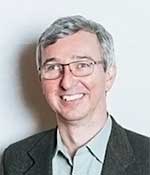 Dr. Jason S Gardner
Dr. Jason S Gardner
Past Chair
After obtaining his Ph.D. at Warwick University in the UK, Jason worked for several national laboratories in North America before moving to Sydney, Australia in 2013. From Sydney, he manages a group of five people performing neutron scattering at ANSTO, Australia, and around the world. He is currently a research Professor at Songshan Lake Material Laboratory, a new research laboratory in China. His scientific interests are primarily in frustrated magnets, but he’s also performed research in many areas of condensed matter over thirty years of research. He has published over 140 papers and 4 book chapters. He was made a fellow of the Institute of Physics (UK) in 2008 and the APS in 2019.
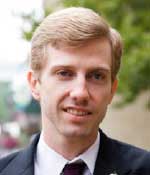 Kevin Ludwick
Kevin Ludwick
Secretary/Treasurer
After Kevin received his PhD from the University of North Carolina, he was a postdoctoral fellow at the University of Virginia for two years. He is now an assistant professor at LaGrange College in LaGrange, GA. He does research in theoretical cosmology, and his interests currently lie in dark matter and dark energy models. He serves as the Dual Degree Coordinator for LaGrange College students who go on to earn engineering degrees from partner institutions.
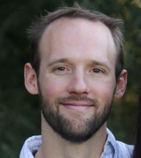 Eric Sorte
Eric Sorte
Member-at-Large
Eric Sorte graduated from the University of Utah with a B.S. in Finance in 2002. He spent 4 years working with various business consulting firms and investor groups in South America and the Eastern United States. After deciding to pursue science as a career, he attended Columbia University in New York City, pursuing a graduate degree in physics. He worked with the High Energy Cosmic Ray group developing software for the Telescope Array Project and received his PhD in experimental condensed matter physics in 2011 studying manifestations of quantum chaos under the advisement of Dr. Brian Saam at the University of Utah. He then did postdocs at Washington University in St. Louis and Georgetown University before starting a job at Sandia National Lab where he is today. As a member of the Graduate School Advisory Committee (GSAC), Eric was instrumental in raising the levels of communication between graduate schools in the College of Science by spearheading interdepartmental activities. Eric has been very active in APS organizations, holding positions on the Executive Committees of the Forum on Graduate Student Affairs and of the Four Corners Section before becoming an APS Councilor. After leaving the Council Eric worked with the Committee on Committees and more recently on the Committee on Informing the Public. As an active member of the APS, Eric has served on various panels both as panel member and host, including several APS webinars. He loves serving in the APS and looks forward to the next opportunity.
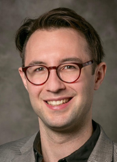 Adam Iaizzi
Adam Iaizzi
Member-at-Large
Adam Iaizzi is a postdoctoral research associate at National Taiwan University. He received a B.S. in physics from Ithaca College (2011) and a PhD in computational condensed matter physics from Boston University (2018). During graduate school Adam was active in student leadership, serving as treasurer and later president of the university-wide Graduate Student Organization, where he successfully advocated for a paid parental leave policy for PhD students and a 75% budget increase for the organization. He also organized events for the women in science group. Within the physics department, Adam helped organize a graduate student peer mentoring program. Off campus, Adam served as a science consultant to Massachusetts State Senator William Brownsberger, where he wrote a report summarizing the latest projections of sea level rise along the Massachusetts coast. Since moving to Taiwan, Adam has gotten involved in science outreach, speaking to junior high school classes about careers in science.
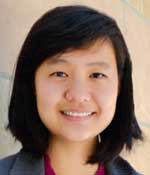 Wennie Wang
Wennie Wang
Member-at-Large
Wennie Wang is a computational materials scientist and currently a postdoctoral scholar at the Pritzker Institute for Molecular Engineering at the University of Chicago. She earned her B.S. in Materials Science and Engineering at MIT in 2013 and her PhD in the Materials Department from UC Santa Barbara (UCSB) in 2018. Her research interests include first-principles methods for energy applications and currently encompass the study of complex oxides for water-splitting applications.
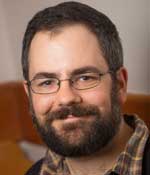 Daniel Borrero
Daniel Borrero
Member-at-Large
Daniel Borrero is originally from Bogotá, Colombia, and he holds a BS in Physics from the University of Texas at Austin and an MS and a PhD in Physics from Georgia Tech. Since 2016, Prof. Borrero has been a member of the Physics faculty at Willamette University, a small liberal arts college in Salem, Oregon. At Willamette, Prof. Borrero's group focuses on studying fluid systems with complex spatiotemporal dynamics, including studies of the transition to turbulence in linearly-stable shear flows and self-organization in bouncing drop systems. Prof. Borrero has taught courses across the Physics major and has recently been involved with departmental efforts to incorporate scientific computation and promote career readiness throughout the curriculum, especially through laboratory and hands-on undergraduate research experiences. Prof. Borrero is currently a member of the Executive Board of the Advanced Laboratory Physics Association (ALPhA) and a member of the Organizing Committee for the 72nd Annual Meeting of the APS Division of Fluid Dynamics. He is also a member of the American Association of Physics Teachers (AAPT) and the Society for Industrial and Applied Mathematics (SIAM) and has previously organized faculty development workshops on the instruction of workplace-ready skills in the undergraduate curriculum through ALPhA and the Partnership for Integration of Computation in Undergraduate Physics (PICUP).
